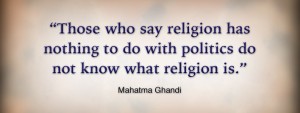Mahatma Gandhi is without a doubt one of the most influential figures of the 20th century. Even if he had not succeeded in his role as a leader in the Indian independence movement, his revolutionary ideas regarding massive nonviolent protests would have inevitably ensured a lasting legacy. However, Gandhi did succeed. And he did so following his philosophy of Satyagrah. The term Satyagrah comes from two sanskrit words; satya meaning truth and agrah meaning insistence. From March to April of 1930, Gandhi led one of his most famous acts of civil defiance: the Salt March. To protest the British denial of salt to the Indian population, he organized a massive group of people to unite together and disobey as a marginalized society. Sure, they all united around the fact that eating salt was a part of their Indian identities. But what else were they were united around?
Gandhi was an ascetic. His philosophy invoked Hindu ideology. Gandhi was just as much an Indian religious figure as he was a political one, albeit he promoted religious pluralism within the country.
The Huffington Post recently featured an opinion piece written by J. H. McKenna titled “Religion Doesn’t Need Politics.” In the article, McKenna, a Ph.D. in the History of Religious Ideas, makes an argument that religion should de-politicize itself in order to be at its “best”. The article immediately caught my attention because it seemed to be in direct contradiction with what I have been learning about the academic study of religion throughout my time here at school. After reading the article I noticed many alarming assumptions that the author seems to be making, either knowingly or unknowingly.
McKenna claims that a “Quietist” view of religion is one that allows for spiritual advancement without any kind of political entanglement. She states that this kind of religion is good for humanity and resists the natural oppression found in political religion. In stating this, McKenna is making a massive claim about the nature of religion itself. The notion of spirituality itself presents religion as something inherently separate from other aspects of human society.
My main problem with her article is shown in the Gandhi quote above: that religion is inevitably intertwined with politics and identity. As long is an imagined community is united around a belief system, that belief system will undoubtedly compromise a part of who they are. The purpose of politics is an attempt to organize society in a way that seems fit for certain social groups. Each social group strives for the best for themselves.
To say that a “Quietist” religion resists political entanglement changes the conceptualization of religious identity itself. Can we call something a religion when it no longer significantly influences our identity?
In addition, the article does not take into account the implications of growing faith in scientific thought present within more modern interpretations of religion. Could this faith in science been seen as just as politically influential as faith in another belief system? What would be the purpose of religion in politics then? After all, if you haven’t heard about it the worlds starting to get a little hotter. Should scientists be quiet then? One cannot be so sure.
